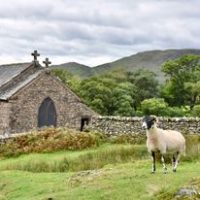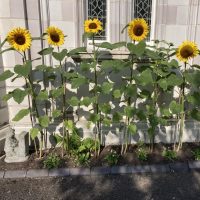Prayers of Approach
Jesus invites us to feast with him:
let us come, for all is ready.
Jesus, our living bread,
we have an appetite for you,
and we come wanting to feed on your word.
Jesus, you offer life to the world,
eternal life, raising us up on the last day.
Keep us hungry for you,
with the anticipation of a feast
of the finest food – food that brings life.
Amen.
O God, your Word became flesh and lived among us.
Thank you that you moved into our neighbourhood,
that you are present with us right now,
dwelling in our hearts and our homes.
Holy God, you are worthy to be praised.
Holy Spirit, we worship you.
Living bread, we adore you.
Amen.
Hymn: Be thou my vision, O Lord of my heart (R&S 489)
Readings: Proverbs 9:1-6
John 6:51-58
Introduction
In Jesus’ description of himself as living bread, we are reminded that bread is one of the basics or essentials of life. The neediest person who has bread (and water) has life. Jesus offers his very being to anyone who wants life. Are we ready to receive him?

Hymn: Jesus the Lord says, ‘I am the bread’ (R&S 199)
Sermon/Reflection
We usually think of proverbs as short pithy sayings which are brief, and sometimes obvious or cliched, observations on life. Quite often too we can find sayings that seem to contradict each other, such as, ‘too many cooks spoil the broth’ and ‘many hands make light work.’ They can be taken to mean that lots of people trying to a task get in each other’s way and mess things up (ie – it’s better to have fewer workers), and lots of people doing a job share the load and make it easier (it’s better to have more workers). The Biblical book of Proverbs is often looked at in a similar way – a set of rather obvious principles or even smug and self-satisfied rules about how to live a pious life.
This couldn’t be farther from the truth. The introductory chapters (1-9) provide us with a way of looking at life which is not simply following a set of rules but involves careful consideration and discernment, and invites us into God’s realm of wisdom. In chapter 9 we are introduced to the personification of God’s wisdom as a woman who invites us to a feast of wisdom, and calls us to leave the ignorant and ignorance behind and to follow the way of knowledge.
As we continue our reading of John’s Gospel for a fourth week Jesus focuses on what is real food and drink, and his invitation to eat and drink his flesh and blood resonates with Wisdom’s invitation to feast and experience the reality of God’s wisdom and knowledge. To the people of Jesus’ day eating his flesh and blood, with it’s implications of cannibalism, would have been just as repugnant to them as it is to us today, possibly even more so since the consumption of blood was expressly forbidden by Jewish Law and therefore total anathema to them. Even though they were familiar with the concept of metaphor and of speaking figuratively they did not have the benefit of knowing what was to come, and understanding with hindsight as we do, so Jesus’ words were doubly shocking and puzzling.
John has prepared his readers for this moment with the prologue to the Gospel, identifying Jesus as the Word of God, and with Jesus’ earlier teaching about wisdom and understanding. Eating his flesh is about taking in his word, the ‘Word made flesh’ and suggests that, as the ‘living bread’, we need Jesus to nourish our lives. We hear echoes of Communion in these verses but they are just as much about our daily living. We need food to live and often our relationship with food is simply personal. We all have our favourite foods and just the sight or smell of them is enough to get our mouths watering and our stomachs rumbling. One of the most evocative smells is that of fresh baked bread. Jesus says he is the living bread and invites us in to a very intimate personal relationship with him, one which is for every moment of every day, not just that special moment of Communion. How often do we feed on his word, drink in his life?
Wisdom’s invitation is to eat and share the knowledge of God. Jesus invitation is to eat and share his life, and enter into eternal life with him. As the custodians of God’s wisdom in today’s world, how can the Church set God’s invitation before others so that they may enter and eat?
Hymn: Seek ye first the kingdom of God (R&S 512)
Prayers of Intercession
Lord Jesus, you feed us with your word and with our daily food. We thank you for interweaving your life with ours, being an unseen guest at every meal. Help us to be grateful for all we eat and drink, for the nutrition we receive to give us strength for life. As we eat, may we also be reminded that you are part of us, life giving, always within us. By the power of your Holy Spirit, may we share your word of life with others.
We pray for people who struggle with their lives;
for those for whom the chips are down
and everything feels like an uphill struggle.
We pray for all whose lives have been affected by tragedy.
Lord, in your mercy,
hear our prayer.
We pray for lawmakers and peacekeepers,
as they seek to make the world a better place;
for police, as they deal with challenging situations…
We pray for the work of hospices,
as they seek to bring a good end to life;
for staff in care and nursing homes,
who have the responsibility of looking after people
who are no longer able to care for themselves…
We pray for parents nurturing children;
for teachers;
and for the church’s role in the nurture
of the physically young and the spiritually young…
We pray for people living with addictions;
for organisations that seek
to help them in their search for wholeness,
and to bring normality back to their lives…
We pray for ourselves,
that we will make the most of our God-given time,
and that we will live well and be thankful…
Lord, in your mercy,
hear our prayer.
Amen.
The Lord’s Prayer
Hymn: Living God, your joyful spirit (R&S 530)
Blessing
After being fed by you, Jesus the living bread,
send us out to feed others.
Now that we are filled with your Holy Spirit,
guide our hands as we offer your life to others.
Now that we have the promise of eternal life with you, Lord God,
give us your love to share with the world.
And as we go may your blessing,
the blessing of Father, Son and Holy Spirit,
go with us, and remain with us, always.
Amen.
Prayers and other material (adapted) © ROOTS for Churches Ltd. Used by permission.






